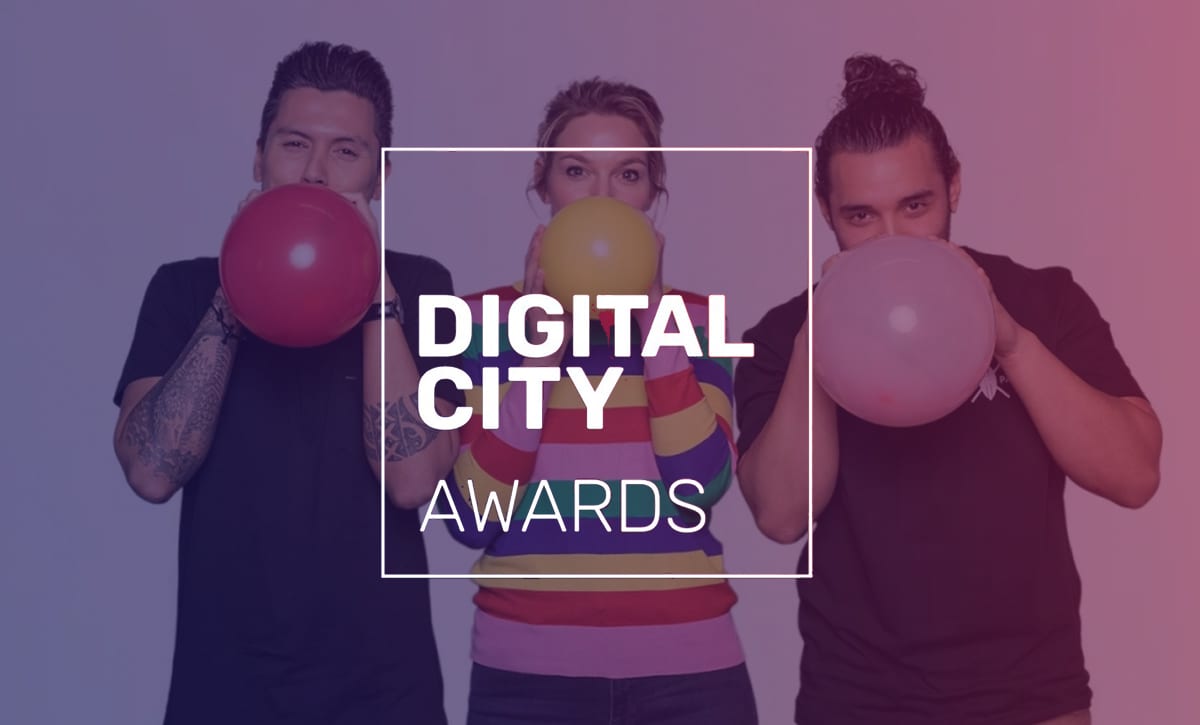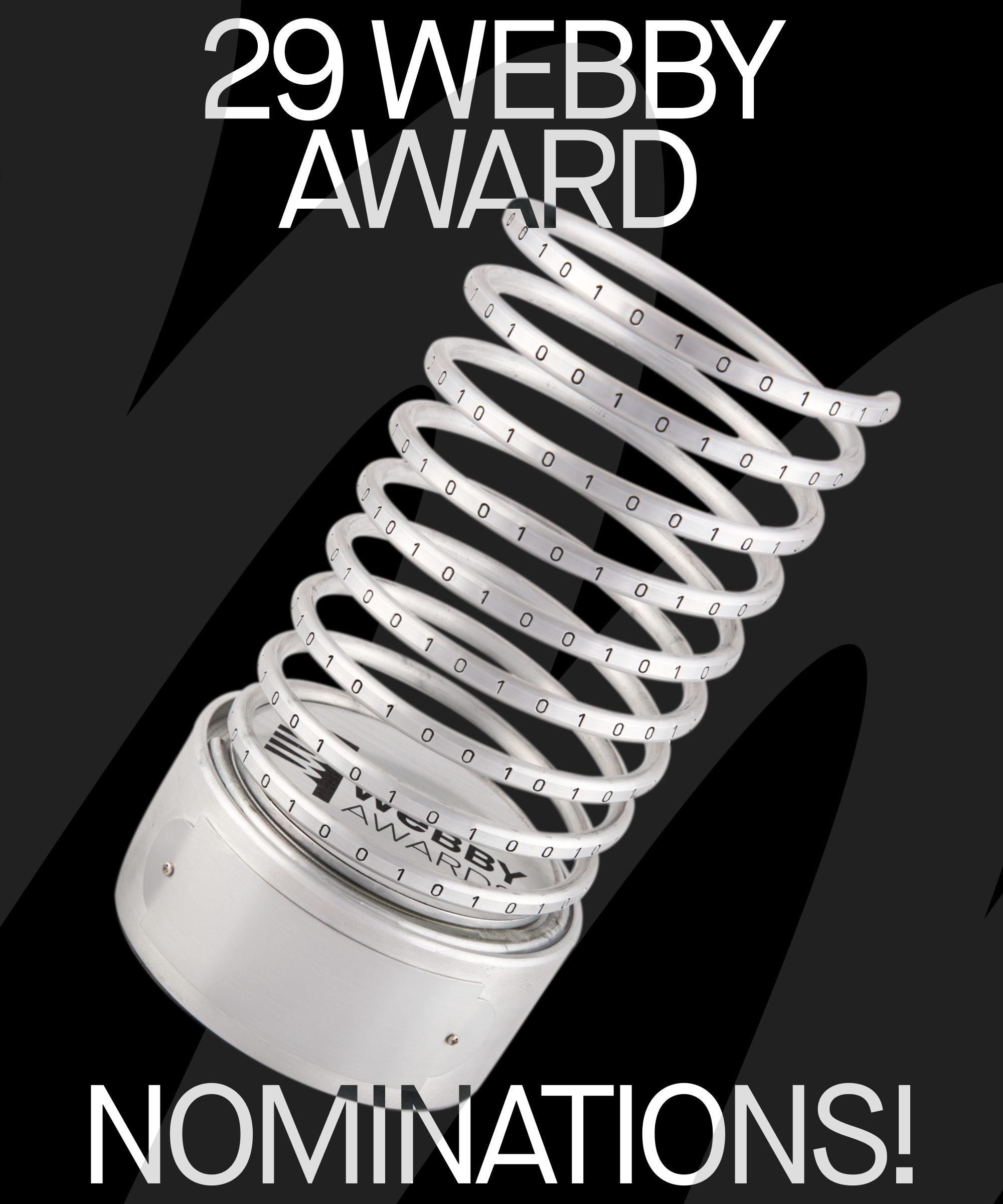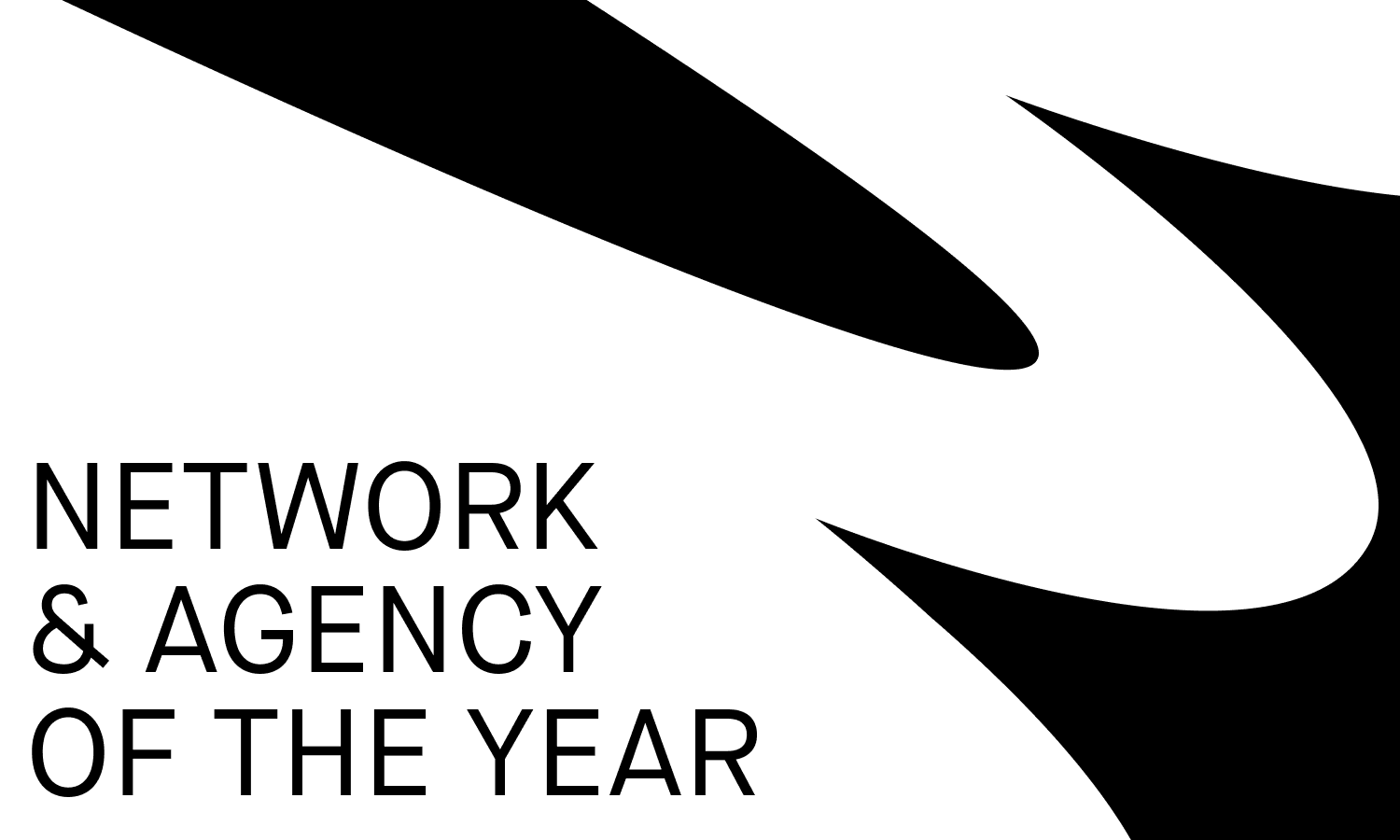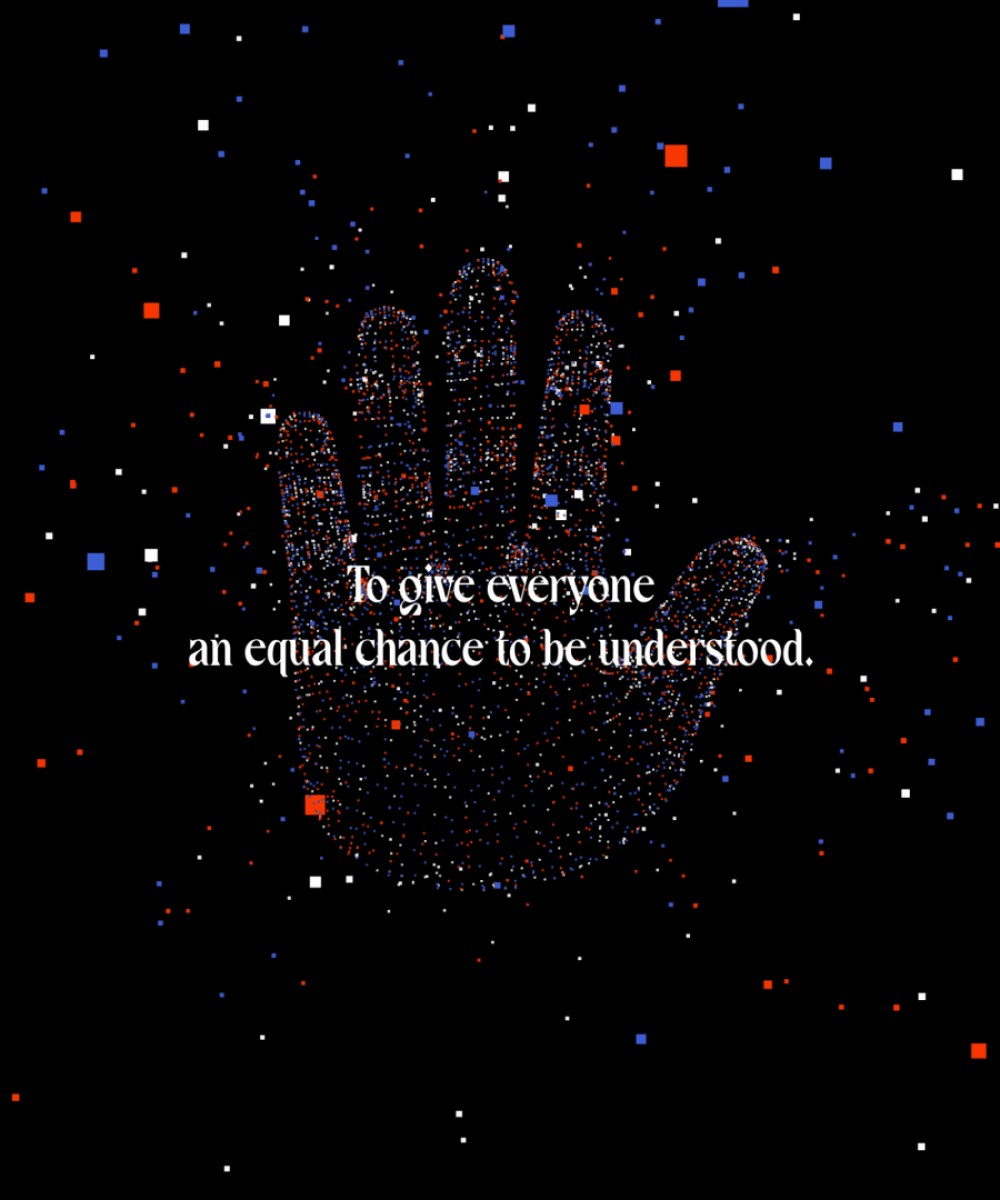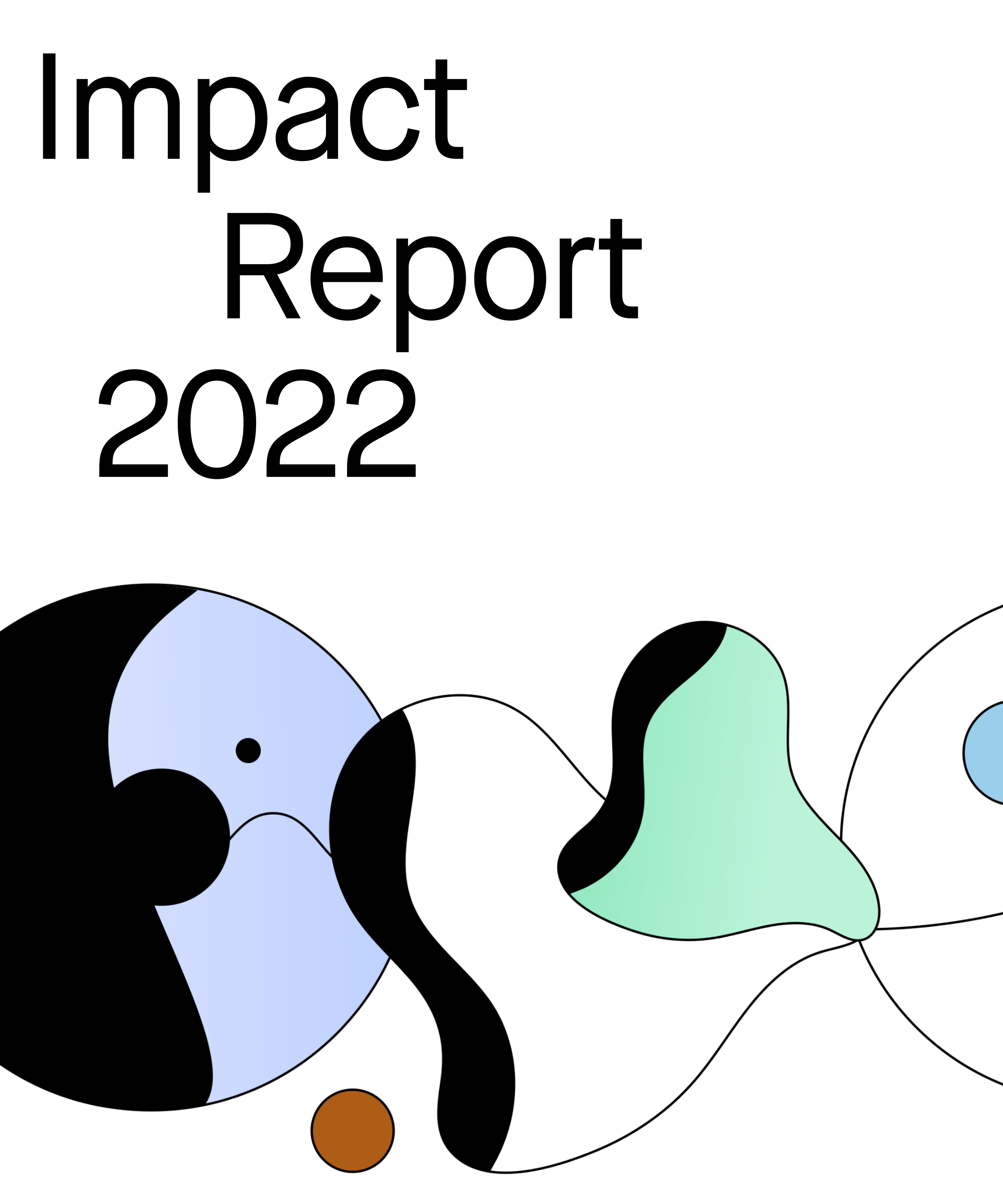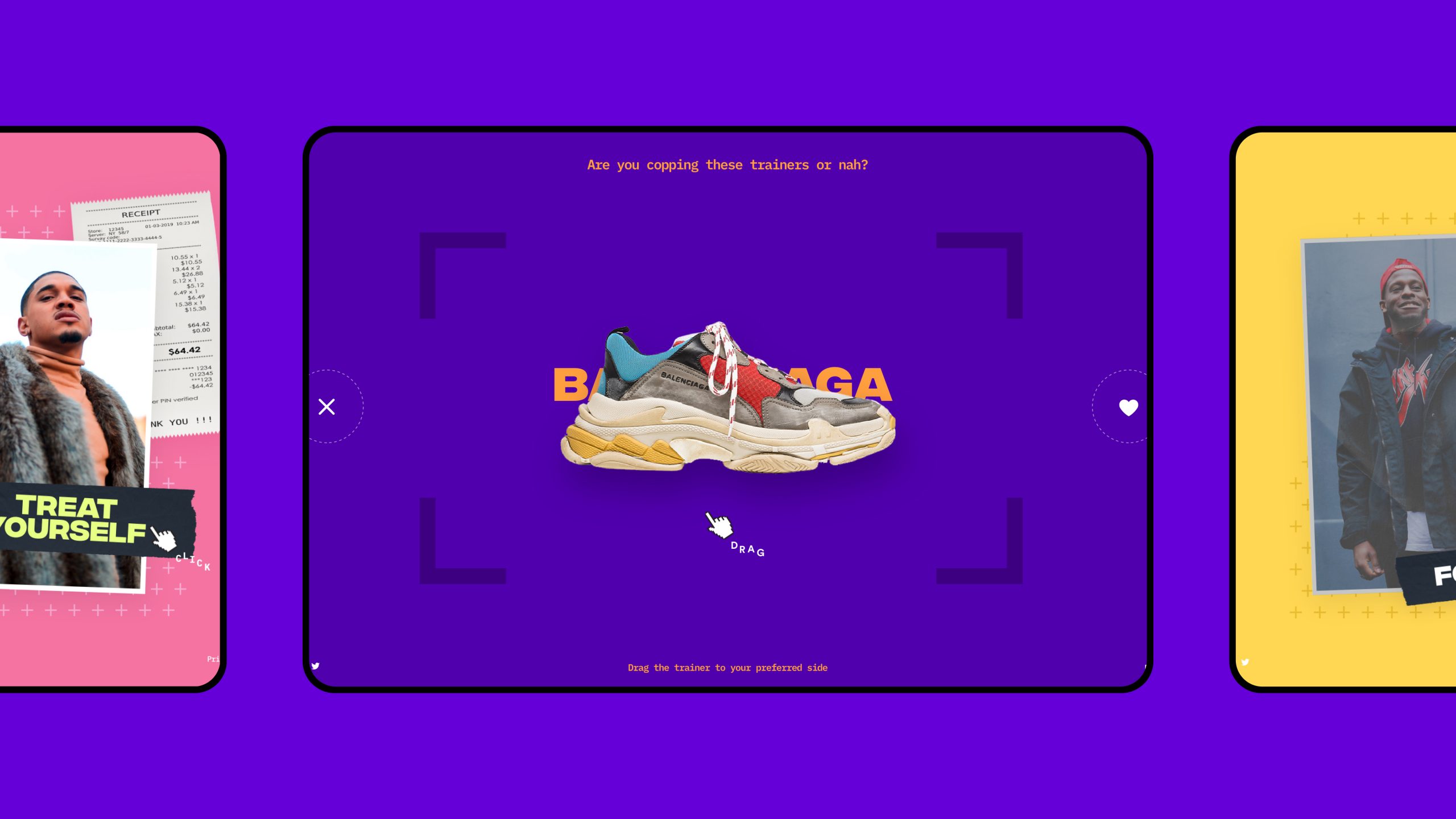DEPT® has scooped the award for Large Digital Company of the Year at the 2021 Digital City Awards for the second year running.
The judges were “impressed how DEPT® evolved and adapted over the past year. DEPT®’s people-first approach was admirable and the level of support showed for its people throughout pandemic was remarkable.”
In the past year, we have introduced Wellbeing Advisors into the business to help Depsters with their mental health, created next-level virtual events for our teams across the world, subsidised WFH equipment, and launched an internal Awards to celebrate Depsters’ achievements. The Lock-In virtual pub lets us unwind as a team and often features special guests for talks and quizzes. Meditation and yoga were hosted throughout the week, as well as internal ‘lunch and learns’ and ‘elevenses’ catchups to keep the team connected. We’ve also implemented a diversity and inclusion calendar to celebrate events and festivals, and encouraged Depsters to take part in Wellness and Sustainability challenges.
When the pandemic hit, DEPT® focused on helping its clients navigate through the disruption. We launched the DEPT® Talks Live series on YouTube to share our insight with the wider digital community, and spearheaded the DEPT® Lab, which offers free digital advice to anyone who needs it. We teamed up with Episerver to launch a service package for frontline industries, and worked with Salesforce to launch a quickstart commerce solution to build a fully-functioning e-commerce site in just three weeks.
Brian robinson, uk managing director of DEPT®, said: “winning this award for the second year running is fantastic recognition of DEPT®’s commitment to being a people-first business. We have ambitions to become not only the best agency in the world, but for the world too, and our people play an integral role in helping us to shape and implement our goals. This year has been challenging for everyone, and I’m extremely proud of our depsters.“
The Digital City Awards marks the end of the first week of the Digital City Festival. As headline partners, DEPT® is hosting a range of events focused on creativity, technology and data. Check out our schedule here.
You can visit DEPT®’s virtual booth on the Digital City Network to meet the team behind the agency. We are super excited to be a part of this and we can’t wait to meet you!
More Insights?
View all InsightsQuestions?
Head of Marketing, EMEA
Mellissa Flowerdew-Clarke
For the second year running, DEPT® is celebrating being named Network of the Year at The Webby Awards, with BASIC/DEPT® also winning Agency of the Year.
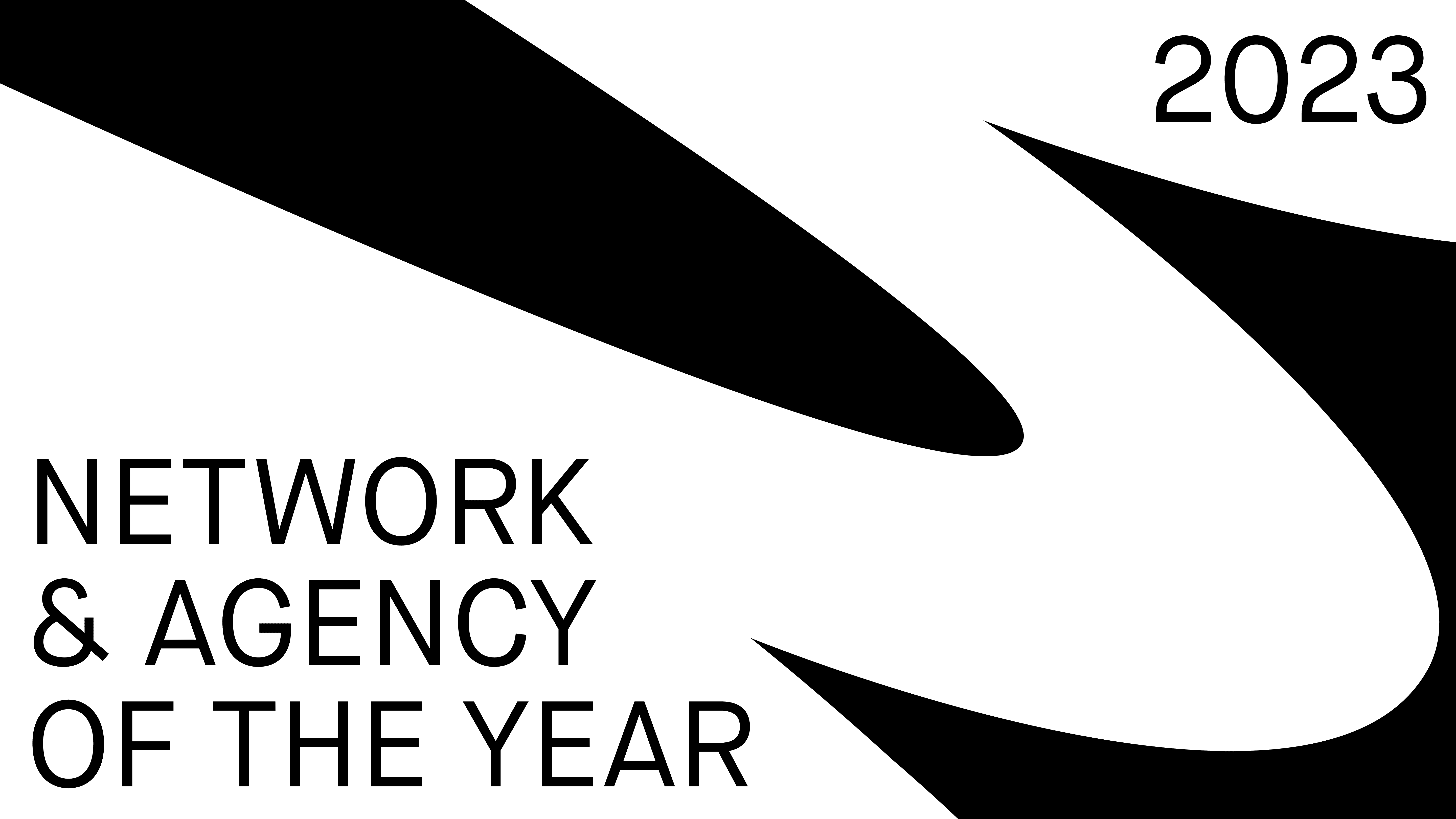
Webby Winners
The Webby Awards is the internet’s most respected symbol of success, attracting over 14,000 entries from 70 countries worldwide every year. It’s been a stellar year of wins for DEPT®, with 6 Webby Awards, 27 People’s Voice Awards, 32 nominations and 20 honourees, for our work with brands including Patagonia, Google, Cowboy, H&M, and KFC.
DEPT®’s work for HYPEWEAR by ABOUT YOU, the first online shop for digital NFT fashion, won both the Webby Award and People’s Voice award for App Features: Best Use of Web3 Technology.
BASIC/DEPT® won both the Webby Award and People’s Voice awards for Google Store in the Websites and Mobile Sites, Best Mobile User Experience category, Google ChromeOS in Websites and Mobile Sites, Best Mobile Visual Design – Function, Patagonia in Websites and Mobile Sites, Best Practices, and The Patagonia Footprint Chronicles site in Websites and Mobile Sites: Corporate Social Responsibility.
The immersive website experience for Virgin Galactic by HELLO MONDAY/DEPT® that communicates the excitement of space travel, won both the Webby Award and People’s Voice awards in General Websites and Mobile Sites – Travel & Lifestyle.
We’re super thankful to our awesome clients and our talented teams whose pioneering work sets the standard in technology and marketing,” said Dimi Albers, CEO of DEPT®. “To be named global network of the year for the second year running and for our BASIC/DEPT® team to win agency of the year is an awesome achievement; we’re humbled and grateful to everyone who voted for us. In our five word speech last year we said ‘we’re just getting started,’ I guess these wins show that we really meant that. :)”
People’s Voice Winners
The public voting declared these following projects by DEPT®, BASIC/DEPT®, HELLO MONDAY/DEPT®, DOGSTUDIO/DEPT® and STUDIO DUMBAR/DEPT® the winners of the People’s Voice awards:
- The unique Web3 experience we created for fashion brand H&Mbeyond, which turned their showroom into an immersive, virtual experience, won for Metaverse, Immersive & Virtual – General Virtual Experiences: Arts, Fashion, Retail & Culture.
- BASIC/DEPT®’s website created for Cowboy, the connected electric bike, won four awards for Best Visual Design: Function, Best User Interface, Best Mobile Visual Design: Aesthetic, and Best Mobile User Interface.
- The website for the first NFT project by artist Jeff Koons won Websites and Mobile Sites – Features & Design: Best Homepage.
- The project for Google ChromeOS won General Websites and Mobile Sites: Web Services & Applications, and the work for Google Store won Best User Experience: Websites and Mobile Sites
- Crafted, the community initiative led by BASIC/DEPT® that brings together local creators and tastemakers, won General Websites and Mobile Sites: Diversity, Equity & Inclusion.
- JAMS – BASIC/DEPT®’s social experiment that connects people with curated playlists won Websites and Mobile Sites – Features & Design: Technical Achievement.
- The Patagonia Footprints Chronicles site won General Websites and Mobile Sites: Sustainability & Environment.
- The app for KFC won General Apps: Food & Drink.
- Webex won Websites and Mobile Sites: Best Navigation/Structure.
- For HELLO MONDAY/DEPT®, Fingerspelling with Machine Learning won three awards in the Games category for Family, Kids & Education, and Social Impact, and in the Responsible Technology category for Accessible Technology.
- The site built to build anticipation for Digital Insight Games’ launch of Cloud Castles won two awards for Websites and Mobile Sites – Features & Design: Technical Achievement, and General Metaverse Experiences: Games.
- Demo Festival – the world’s largest festival of motion design – organized by STUDIO DUMBAR/DEPT® won General Websites and Mobile Sites: Events.
- DEPT®’s very own Meta Festival – the first 24hr event in the Metaverse – won Metaverse & Immersive Features: Best Community Engagement, and Metaverse, Immersive & Virtual – Virtual Video Features: Best Festival or Conference.
Honourees
In addition to the award wins, 20 projects for the following clients were shortlisted or awarded as Honourees: Inter Milan; Lululemon Studio; Design Within Reach; Google Store; Jeff Koons; KFC; VIZIO; eBay; Adobe; HAPE; Meebits; Panasonic; Sprite; DIG: Cloud Castles.
Congratulations to our talented teams, and a huge thank you to our awesome clients who entrust us to pioneer their marketing and technology.
More news
Questions?
Global Head of Marketing
Marjan Straathof
Sustainability is no longer a buzzword, but a critical business strategy for 2023 and beyond.
Globally, 95% of consumers consider a product’s sustainability to be important and 88% shared their intentional support for a brand that supports social or environmental initiatives.
But as climate change becomes increasingly dire, brands—together with the larger world—have also become aware of the environmental costs of technology and digital marketing. As much as 32% of an individual’s carbon footprint comes from advertising. And with $500 billion spent by marketers on advertising every year, you can understand how significant the industry’s impact on climate change is.
With that in mind, as both a digital agency and a certified B Corporation, we’d like to share some strategies for green-ifying your digital business and marketing efforts.

Create campaigns with a net zero footprint
Advertising-related emissions aren’t just already responsible for a significant portion of global emissions, they’re increasing as well. Between 2019 and 2022, emissions from advertising campaigns increased by 11%.
If you’re looking for a way to bolster a reduction strategy or to kickstart a sustainability initiative, marketing and advertising campaigns are a logical place to start.
One means of mitigating the impact of marketing campaigns is by offsetting them using a trusted provider to purchase carbon credits. We work with ClimatePartner, which helps us measure the impact of a campaign and source a sufficient amount of carbon credits to compensate for it.
By working with vendors like ClimatePartner, you can also walk through a few potential strategies for your campaign to determine what channels you can utilise that strike a balance between audience impact and carbon impact.
Build greener solutions
Tech is changing in more ways than one. Not only are innovations like Web3 emerging, so are ways of improving tech’s sustainability.
When it comes to cloud environments and cloud-based architecture solutions, providers like Microsoft offer options that can vastly reduce your carbon footprint. Compared to old-school on-premises data centres, Microsoft Azure is as much as 98% more carbon efficient.
Within the past several years, other cloud providers have also taken steps to increase their efficiency and reduce their environmental impact. To get a feel for how effective (or ineffective) these providers have become, it helps to use a metric called “power usage effectiveness,” or “PUE.”
PUE is expressed as a ratio, with efficiency increasing as the quotient decreases toward a value of 1.0. The average PUE for an on-prem data centre is 1.70, by contrast, Microsoft Azure has a PUE of 1.18.
Given these recent developments in sustainability, we’re now helping clients re-assess their architecture and build a solution that keeps sustainability top of mind.
By using a cloud environment based in Microsoft Azure, AWS, and/or Google Cloud, you’re not only able to build a greener architecture, but you can also automate key processes to eliminate overconsumption of cloud resources and better your system’s PUE.
Manage your carbon impact with Net Zero Cloud
Salesforce’s Net Zero Cloud was launched last year to allow companies to report on their carbon emissions.
Net Zero Cloud is an easy-to-use system within Salesforce that uses a set of predefined emissions factors for measuring the carbon emissions associated with everything from the impact of your tech stack to energy consumption within offices to commuting and travel. In turn, it calculates the number of carbon credits you’ll need to purchase to offset your brand’s footprint.
Overall, the system does more than help you to measure and offset your brand’s carbon footprint: it also helps improve transparency with stakeholders at your brand and allows you to strategise your emissions reduction by testing various scenarios.
Having already implemented Net Zero Cloud for ourselves to help us stay on top of our sustainability goals, DEPT® has also become a Net Zero Cloud partner to help our clients do the same.
Encourage thinking about carbon
Thinking about sustainability can feel overwhelming at times. Let’s face it: every day the work we do in our industry inevitably puts more carbon into our atmosphere.
That said, by encouraging folks within your team and at your company to start thinking about carbon more often, you’ll find that many small-scale changes add up.
For instance, the video and content production team at DEPT® has started encouraging clients to donate £250 per shoot to offset the carbon emissions associated with the project.
Although the team isn’t able to measure the exact emissions associated with a given shoot, their mission to do good has made a difference. In total, they’ve helped raise nearly £12,000 for the Woodland Trust, a British reforestation project that plants native trees throughout the country.
By learning to think about your emissions output, you and your team will start to learn how to weigh your options and make choices or create new practices that help the planet.
The bigger picture
As consumers demand more from brands, many have taken it upon themselves to commit to achieving net zero carbon emissions on a company-wide scale.
DEPT® achieved our own net-zero goal following our Climate Neutral Certification in 2021. As part of this certification, we’re required to measure our company-wide carbon footprint every year and offset it using carbon credits.
That said, should you choose to pursue your own large-scale net-zero goal, it’s important to remember that carbon credits are just a piece of the puzzle. They don’t erase your impact, rather, they’re a way of taking responsibility for them while you actively work on reducing emissions with strategies like those we’ve outlined here.
If you’re interested in partnering with an organisation to help your brand go net zero, we highly recommend Climate Neutral for their support in creating and holding us accountable in hitting our reduction strategy targets.
Interested in learning more about purpose and sustainability in 2023?
Download the DEPT® 2023 Trends Report.
Questions?
Global Head of Impact
Pooja Dindigal
Forrester recently published its “Now Tech: Global Digital Experience Services, Q4 2021” report to profile 37 digital providers that are helping brands with digital marketing, commerce and customer experience initiatives.
In their report, Forrester analysts Ted Schadler and Frederic Giron define digital providers as “essential partners to building [your brand’s] digital experience.” And digital experience means quite a lot. It embodies the combination of creativity and technology; everything from strategy, to implementation, to marketing, to optimisation, and all that’s in between.
From our perspective, the digital experience is just as essential as your brand’s digital provider. Maybe now more than ever. After all, during the first three months of the pandemic, digital advanced the equivalent of ten years. A year and a half later, the world is now more digitally literate than ever before. And it’s only getting more so. To make it in a digital world, businesses must develop digital experiences to both meet the current needs of their customers and to future-proof their brand.
When shopping for the digital provider that will best fit your brand’s digital needs, Forrester breaks their recommendations down according to size. DEPT® is relatively small in this standing, at about 2,500 employees compared to 25,000 at large providers.
That said, what is the benefit of making your essential partner in creating digital experiences a comparatively small provider?
Forrester reports that, unlike the large and mid-sized digital counterparts, “Smaller providers generally don’t have the breadth or scale but may offer specialties that the bigger players don’t provide.”
Other major research firms confirm the value of a specialised digital experience. McKinsey notes that a highly personalised, individual approach to a customer experience – particularly when a brand’s customer base is in the millions – boosts customer loyalty and gives that brand a competitive edge that is hard to imitate. And Harvard Business Review observes that in a world where digital feels almost ubiquitous, “there is no satisfactory excuse for a poor digital experience.” In short, if a brand does not successfully meet or surpass a customer’s digital expectations, they’re quick to move on. After all, countless other brands are just a quick search away.
We can also confirm the value of the specialised digital experience because we are highly specialised. Because “small” certainly does not mean that pushing out amazing global digital experiences is beyond our capability. Whether it’s the unique AR filter & branded hashtag we created for ASOS that generated over 1.2 billion views in just three weeks, the Lovie-nominated virtual landscape we were tasked with creating for the Eurovision Song Contest, or our work for Philips’ “Right under your nose” campaign to raise awareness of men’s health issues, we believe that specialised digital experiences work really, really well.
More Insights?
View all InsightsQuestions?
Head of Marketing, EMEA
Mellissa Flowerdew-Clarke
Aspiring to be the best agency we can be, for the world
We’re firm believers in the power of digital to not just change the world, but to make it a better place. That’s why we couldn’t be prouder to be a Certified B Corp™ . DEPT® became a Certified B Corp in October 2021 and in our first year of achieving the certification, we were recognised as one of the Best for the World™ B Corps of 2022 in Governance. This puts us in the top 5% of B Corps in our size group around the world.
Becoming a B Corp was confirmation that, together, we are building an agency that has a positive impact on our people, our clients, the planet and society at large.
As a B Corp, DEPT® has joined a community of 5,000+ businesses across the world – and across all industries – seeking to use their business as a force for good, dedicated to balancing purpose and profit. This collective includes Patagonia, Ben & Jerry’s, Rituals and Allbirds, to name a few of our favourites.

Becoming (and staying) a B Corp is not easy
Our B Corp Certification keeps us accountable to our #goodcompany goals. We are asked to assess our performance every three years across five key areas of impact: workers; clients; governance; community; the environment.
We are also legally committed to consider the impact of our business across those five areas and we pass a questionnaire of negative risks.
DEPT® is proud of our score of 89.2 points on our initial certification, and we’re excited to work on increasing that score over time.
Our B Corp Certification and the B Impact Assessment provide us with a framework to communicate, assess and improve our impact. It helps us to build a roadmap for positive impact, from our employees to our office waste, our supply chain to our clients.
So, what prompted us to invest so much in this certification?
In short, our Depsters. Our B Corp journey began as one colleague’s suggestion. That sparked a company-wide mission motivated by the combination of creating great work for clients and making a positive impact on the world. This mission was 100% driven by a team of more than forty Depsters, who took on the hefty responsibility of measuring those dozens of factors in addition to taking care of their regular day-to-day.
Now, we’re working hard to ensure that our #goodcompany goals and ambitions are integrated into our day-to-day work. You can read more about all of our initiatives and progress in our Impact Reports:
Download our 2022 Impact Report
Download our 2021 Impact Report
Download our 2020 Impact Report
What does it mean for DEPT®?
When we first set off on this company-wide mission, we thought we were in pretty good shape. We had just become a Climate Neutral company. We had also worked on a number of impact projects with clients who we were extra proud to support in their missions to better the world, including creating a branded commerce experience rooted in sustainability for Patagonia, reinventing the agricultural life cycle with Indigo Ag, using the power of technology to do good with JustDiggit and creating a conversation around mental health with Ireland’s HSE. For these reasons, we thought we were already a good company. But — plot twist! — turns out that we could be a lot better.

We are just getting started
Becoming a B Corp™ forced us to think about how to make our Impact Strategy more effective and take a 360-degree view to be a good company. It also showed us that, although we had already made some significant strides, truly being a good company requires dedication towards an ongoing mission to improve DEPT® from the inside out. We continue to be guided by our Impact Strategy, developed in 2020 to focus across three main pillars: Climate; Clients; Diversity, Equity & Inclusion (DE&I).
Here’s what we have in store.
01. We will fulfil our human responsibility to protect the climate. The bedrock of our climate strategy is focused in the areas in which we have the greatest impact on the environment: our offices and energy usage and our emissions from commuting and business travel. If we want to be a leading business in the 21st century, we know that we need to have a sophisticated, well managed and specific climate strategy, particularly as we grow.
02. We want to ensure that we’re creating impact through our clients and for our communities. As of 2022, nearly 9 of DEPT®’s revenue came from client projects with a positive social or environmental impact. By 2023, that portfolio of impactful work will expand to represent 15% of our total revenue. And we won’t stop there. We also pledge to donate 1% of our total profits to support purpose-driven organisations via pro bono work, direct donations, and during DEPT® Cares Day, our annual global day of volunteering.
03. We will fulfil our responsibility to create a company that is diverse, equitable, and inclusive. By 2023, our workforce will be a solid representation of society at large and more than 40% of our leadership team and managers will be female or nonbinary.
We’re also committed to undergo a Diversity, Equity & Inclusion strategic planning process that respects and adjusts for the local realities for the places in which we operate. This strategic planning process will result in localised and relevant targets and initiatives for our teams on topics such as race, ethnicity, sexual orientation, neurodiversity and more.
All told, this is just the beginning. In our journey to become a better good company and also on a much larger scale. We believe that digital marketing and technology can create a better future. By promoting a fairer, more equitable society and solving global issues like climate change.
And, as a company of digital thinkers and makers, that’s a future we can’t wait to get started on.
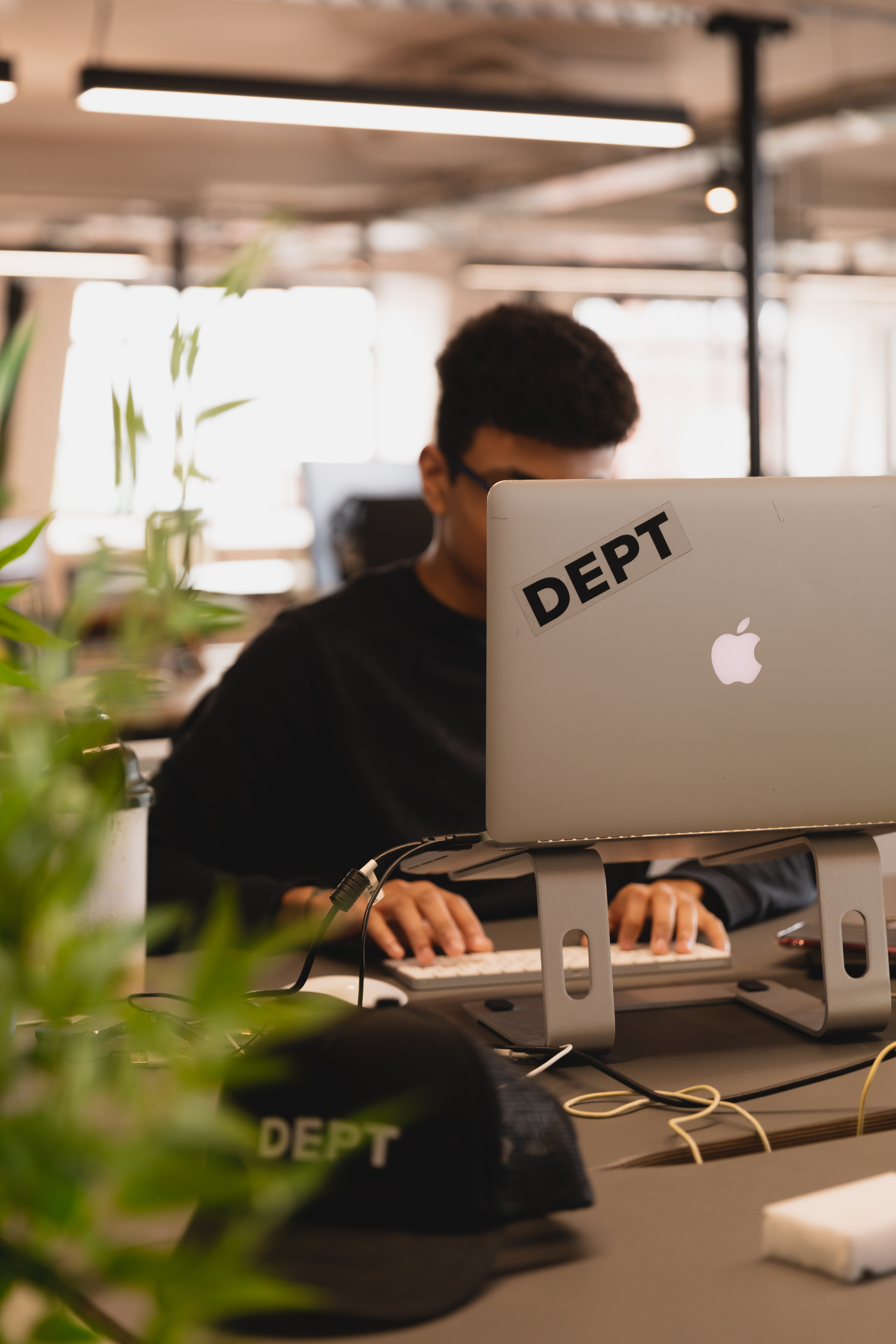
Customer experience (CX) is what separates a positive digital interaction from a negative one. A recent study found that almost three quarters (74%) of consumers are likely to buy based on experience alone, yet 83% of executives face ‘moderate’ to ‘severe’ revenue and market share risks due to poor CX. The gap is wide, but most businesses are rightly standing up and taking action, with around 60% of companies making the delivery of quality customer experiences their top priority within digital transformation plans.
One of the biggest blockers of delivering optimum digital experiences is outdated, inflexible and disconnected technologies and tools. The solution? Composable digital experience platforms (DXPs). These DXPs are your potential solution to effectively managing and optimising digital experiences from a single portal.
We’ve compiled everything you need to know about composable DXPs, including the benefits and some of the key considerations to help you decide if it’s the right solution to help your business maximise digital customer experiences.
Suites vs stacks
Suites
‘Monolithic’ digital experience platforms (DXPs), often called suites, have historically been the leading choice, providing companies with everything they may need in a suite of applications. They provide a single platform for managing and optimising all digital content and campaigns, enabling businesses to tap into all digital aspects of their operations and create engaging touchpoints at every stage of the customer journey, from discovery to post-sales. But being locked in to a single vendor or technology has the potential to create limitations, and the complexity often requires businesses to hire team members with a specific skill set to build the experiences they need and want.
Stacks
The recent, rapid acceleration of digital transformation plans has driven a dramatic increase in the volume of companies opting to implement more modular, headless technology ‘stacks’. Built on an open, API-first approach to software and adopting a best-of-breed methodology, many of these stacks use a cloud platform to provide scalability and secure integration. They aim to break release cycle issues as they use a software ecosystem that provides a flexible, open and future-ready architecture.
The growing popularity of headless technology stacks has led longstanding DXP providers to rethink and reimagine their products, which has seen many of them move away from the monolithic approach to offer a hybrid solution: composable DXPs. These allow clients to break free from the traditional constraints of platform lock-in, large implementation updates, and significant upfront costs.
By no stretch of the imagination does this mean that monolithic architecture is unsuitable. As a package, this can still be the best option for businesses depending on their use case, requirements and points of differentiation; all of which are key considerations in making the best decision for your business and customer experiences.
What is a composable DXP?
A composable digital experience platform removes the challenge of platform lock-in and takes the centralised approach to the next level. It operates as the backbone of digital content, supported by a series of interchangeable building blocks, as opposed to the tightly coupled, all-in-one structure of traditional DXPs.
These building blocks, made up of APIs and integrations, can be tailored around existing processes and infrastructures, allowing for faster change and differentiation in approach to deliver digital experiences as efficiently and effectively as audiences demand them. Some of the key benefits include:
- Flexibility – composable DXPs remove the issues associated with vendor lock-in, enabling companies to implement new features that may not have been possible to integrate within traditional suite solutions if the vendor did not provide them. Rather, the DXP becomes a control centre for all customer touchpoints, enabling the integration of technologies that will continually optimise the customer experience and minimise the risk of them looking to other providers that offer the features they expect. Composable DXPs also free businesses from having to develop marketing plans within the limits of the suite, facilitating creativity and growth through the ability to experiment, analyse and optimise marketing activity within the platform.
- Customer-centricity – by decoupling implementations and bringing the entire marketing stack together (including content management, marketing automation, ecommerce, personalisation and analytics), within a central platform, it is possible to establish an architecture that is best suited to customers and making it easier for brands to connect with audiences in smarter ways. With integrated analytics and reports, marketers can analyse and adapt to customer behaviour trends and create omni-channel campaigns and experiences from one platform, instead of forcing them into predefined customer journeys.
- Speed – composable architecture allows businesses to take advantage of SaaS speed of innovation, but with the adoption of products that fit your business requirements and ways of working. This enables businesses to deliver value to market faster than what is possible with an all-in-one approach, where a slower pace of implementation can hinder companies from keeping up with fast-moving competitors. A composable DXP allows teams to build digital experiences, reuse content, personalise it at scale, test multiple variants, get detailed insights, and continually optimise CX without learning new processes or being slowed down.
Spotlight on Sitecore
As organisations across the world embrace agility, they need technologies flexible enough to adapt with them. Gartner predicts that “by 2023, organisations that have adopted an intelligent composable approach will outpace the competition by 80% in the speed of new feature implementation.”
Acknowledging this, Sitecore is one of the latest digital experience platform providers to offer a composable DXP solution in addition to its ‘all in one’ DXP; providing further evidence that composable is a compelling offer. Sitecore’s dual strategy allows businesses to choose whether to invest in the full suite offering, or a more agile, ‘best of breed’ solution.
Sitecore has acquired a series of companies to be able to offer this solution, including Boxever, Four51, Moosend and, most recently, Reflektion. These acquisitions equip it with best-of-breed functionality in customer data platforms, B2B commerce, digital marketing and retail analytics. DEPT®’s experts recently shared their thoughts on what this might mean for Sitecore and its clients.
Defining your roadmap
When considering software solutions, and whether a composable DXP is right for your business, it’s imperative to consider your business needs now as well as in the future to ensure that your choice serves your business for years to come.
Before shortlisting options, we recommend defining your business goals. It’s important to not define these purely from a sales or revenue perspective, but also consider customer acquisition and retention, customer satisfaction and loyalty, launching in new markets, and brand awareness. You can then identify the technologies and marketing channels that will get you there, and how each of them needs to deliver.
It’s important to also consider the CX facets that differentiate your company, as well as the business areas that are likely to grow or need to adapt to meet your future goals. Following this, you will be able to map out the functionalities and tools necessary and compare potential solutions against your needs. This internal preparation will put you in the best position to embark on your composable DXP roadmap to choose and implement the right solution for your business.
Seek expert advice
The suite vs stack debate is certainly nothing new, and with supporters on each side of the fence pushing their preferred solution, it can be difficult to choose a side. And while composable DXPs provide more of a middleground, offering the benefits of both archetypal suite and stack solutions, it is yet another option to weigh up.
That’s why it can be helpful to seek the advice of those who have extensive experience in implementing different solutions to help you make your decision. DEPT® takes an agnostic view; with extensive experience in implementing and optimising these technologies, our team recognises that every business is unique, and so their digital solutions should be too.
By thoroughly analysing your requirements, position in the market, future goals and budget, we can recommend the right architectural blocks to deliver the most compelling digital solution for your business. Get in touch with our experts today to find out how we can help you define or accelerate your digital roadmap.
More Insights?
View all InsightsQuestions?
Technology Consultant
Phil Robinson

DEPT® has taken home the trophy for Large Digital Agency of the Year at the Prolific North Champions Awards.
Previously known as the Prolific North Awards, the ceremony recognises the organisations, teams and individuals putting the North on the map in the creative and digital sectors.
Up against some of the UK’s top digital agencies, DEPT®’s win celebrates its status as one of the fastest growing agencies in the world.
The news came on the same day that DEPT® secured a triple win at the Optimizely Partner Awards, being named ‘Optimizer of the Year’ across three key regions.
Over the past 12 months, DEPT® has been recognised as Large Digital Company of the Year at the Digital City Awards and retained its podium position in Prolific North’s 2021 Top 50 Digital Agencies rankings, coming in third overall and number one in Manchester.
The team has also secured 11 Webby Awards, was named Agency of The Year at the Lovie Awards and won a global Sitecore Ultimate Experience Award for its work with Triumph Motorcycles.
Brian Robinson, DEPT®’s UK Managing Director, said: “Winning this award is a huge honour and goes to show how our incredible team has flourished even within the toughest constraints. Despite the disruption of the last 18 months, we have demonstrated resilience and optimism and will continue to push the boundaries to help our Depsters, our clients and our community thrive.”
With ambitions to become the best agency both in and for the world, DEPT® has supported clients to fuel new processes, reduce reliance on in-person services and open new revenue streams throughout the pandemic. We have also introduced a raft of new employee initiatives to boost Depsters’ health and happiness.
DEPT® is having a major impact on the digital and tech industry, helping to shape the next generation of talent, industry collaboration and leading innovation. Our ability to integrate technology, creativity and data has led us to work with leading brands including London Marathon Events, Nikon and Co-op Live.
And the future is looking bright. After recently becoming climate neutral certified, which coincided with the release of our first impact report, DEPT® continues on its quest to gain B Corp certification by the end of 2021.
More Insights?
View all InsightsQuestions?
Head of Marketing, EMEA
Mellissa Flowerdew-Clarke
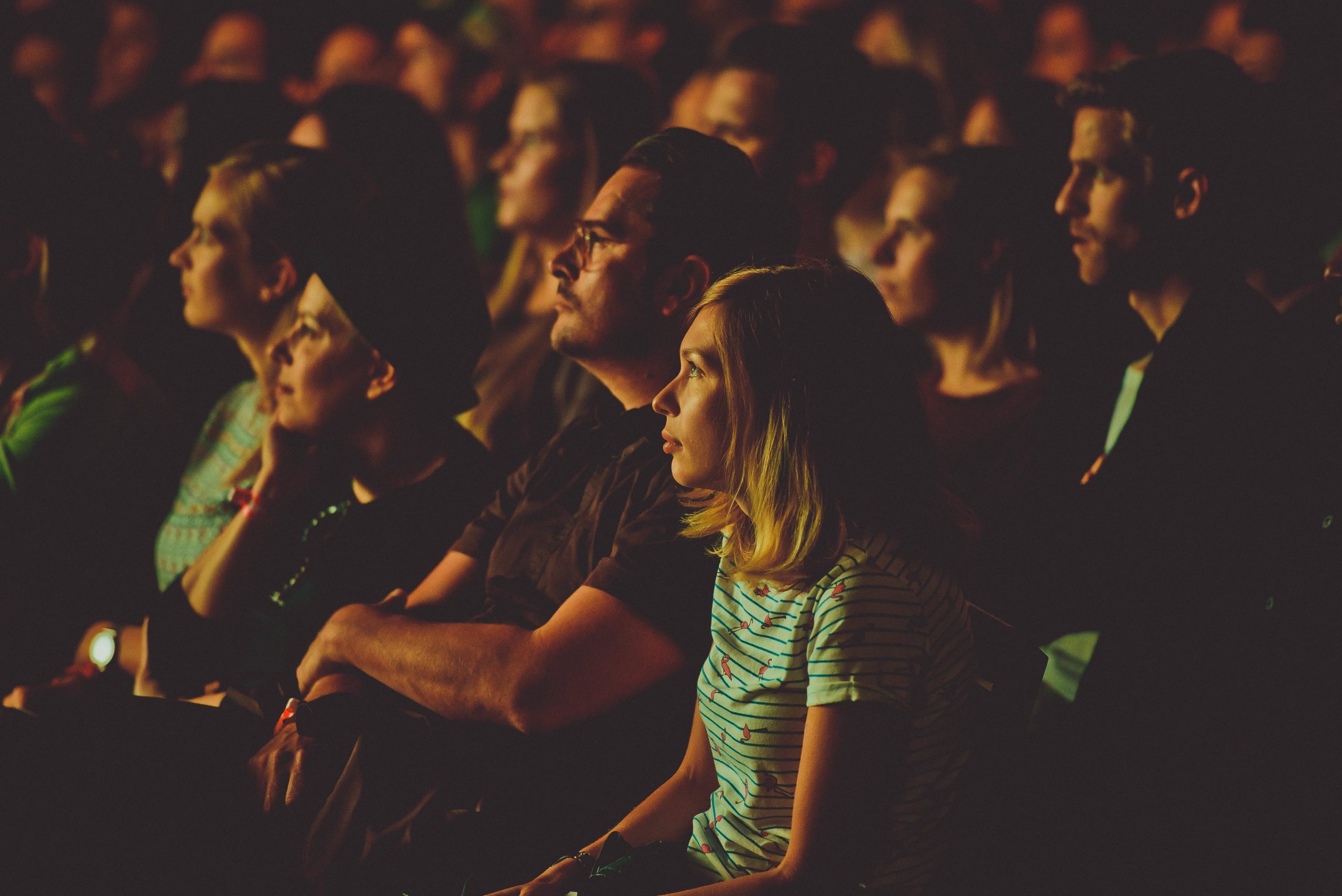
It can feel impossible to capture the spirit and energy of physical events and translate that into a digital experience. For years, employees have gathered by the water cooler or gone on company outings together. But that is no longer possible. Virtual calls have replaced our daily coffee meetings, and although they help are an important communication tool, many people find them draining. This makes hosting digital events difficult, as you miss the experience and magic of the physical experience. And to be honest, they simply get boring.
This was the challenge that we faced for our own flagship annual event: DEPT® Festival, a recent winner of the Dutch “Golden Giraffe” award for the best brand event. Over the last five years, what was once a small gathering had transformed into the industry festival of the year, hosting thousands of visitors from around the globe for three full days of inspiration on the future of creativity, data, and technology. However, COVID-19 forced us to re-imagine our flagship event.
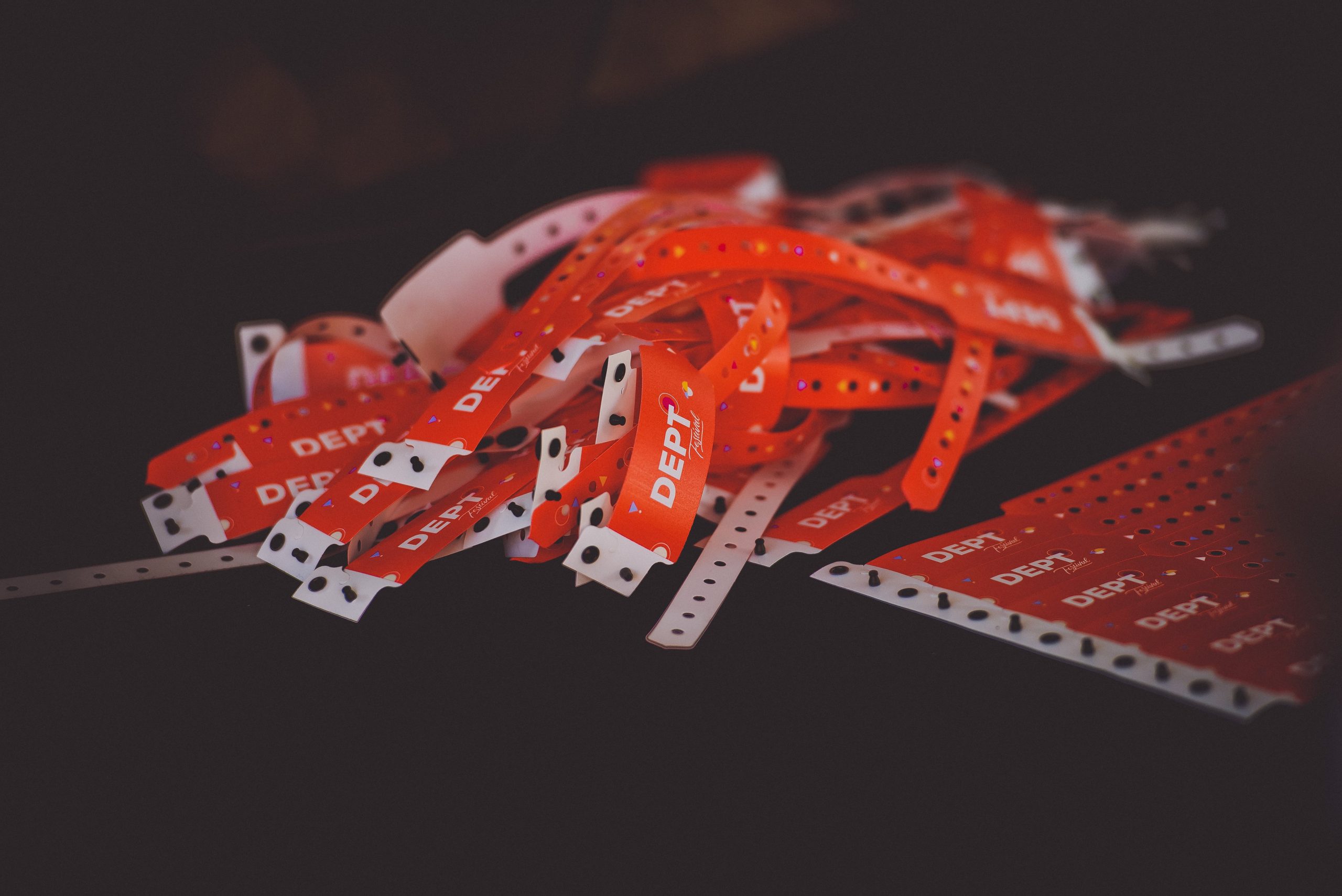

The show must go on
Our challenge was to fit three days worth of activities and inspiration into three hours while making it feel like it all lasted only three minutes. To do this, we decided to create a next-level virtual experience full of energy, a little crazy and above all personal. And that’s why we reimaged the physical experience and transformed it into a virtual one by building an interactive, 3D festival map which supported 15 stages across which more than 35 presentations took place.

Designing and building a next-level virtual experience for Depsters worldwide
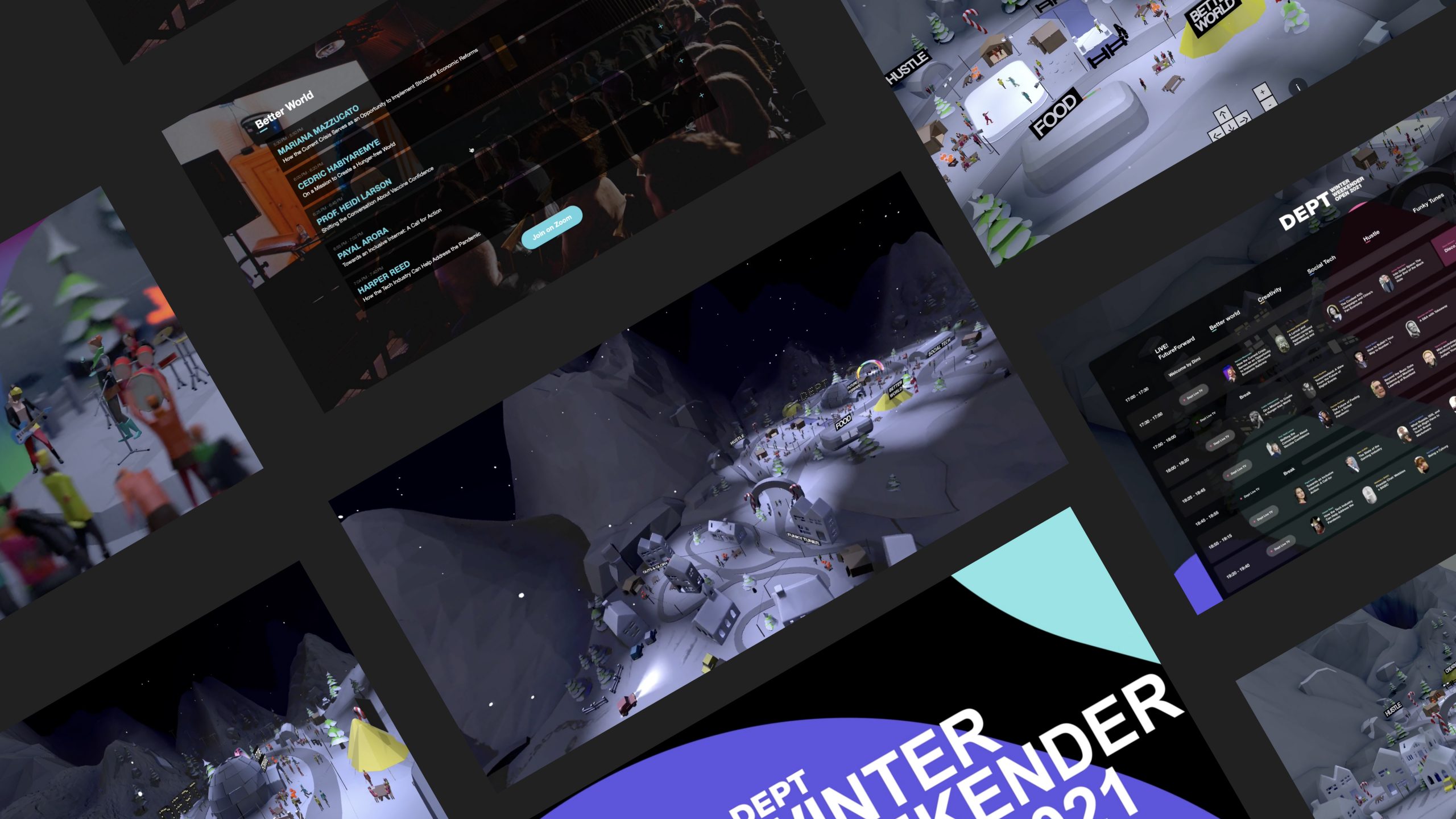
The process behind creating a next-level digital event
Simply transferring all the elements of the original festival to a virtual platform would have led to a clumsy, unsatisfying result. Therefore, reimagination was the key. To kick off the process, we started by conceptualising our vision, the platform and the architecture of the event. The concept was crucial as this became our red thread both visually but also across our communication which we could always refer back to.
With a clear theme and concept, we quickly began to build our 3D map using React Three Fiber, a front-end tool specifically engineered to manage and bring 3D experiences to life. This, in turn, connected to Zoom, Slack and Vimeo. Our designers had the first version up and running in just a couple of weeks.
While our developers and designers continued to refine and test the platform, our communication team arranged 50 speakers in addition to 15 stage hosts while also locking in extra goodies and entertainment we had up our sleeve.
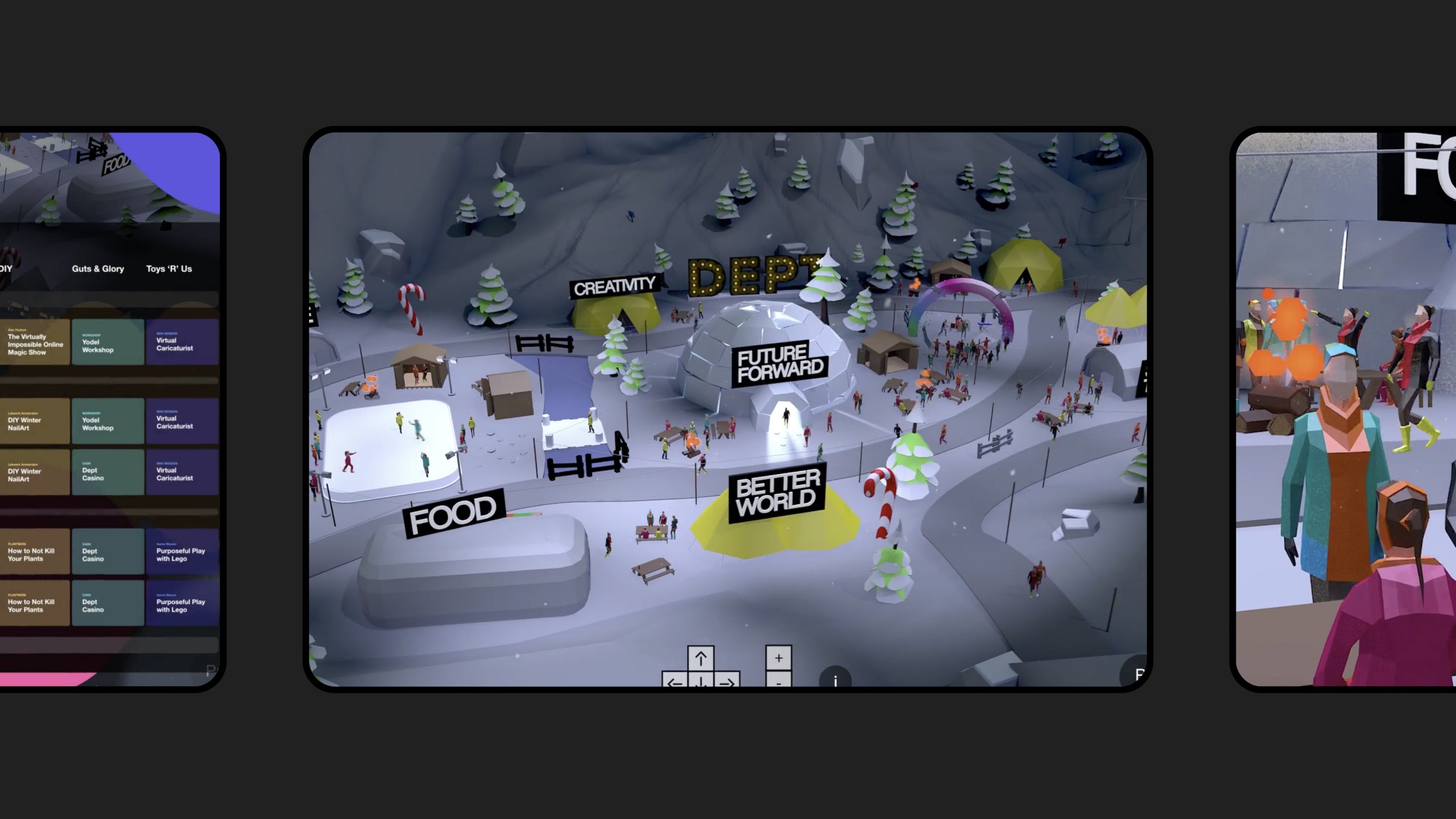
Enticing and hyping up Depsters for what’s to come
Apart from designing the experience, we wanted to excite Depsters with what was to come. So we crafted an internal social campaign which included daily hints from our zebra mascot and teaser videos. These social drops excited Depsters worldwide and conveyed that this was not an ordinary Zoom event.
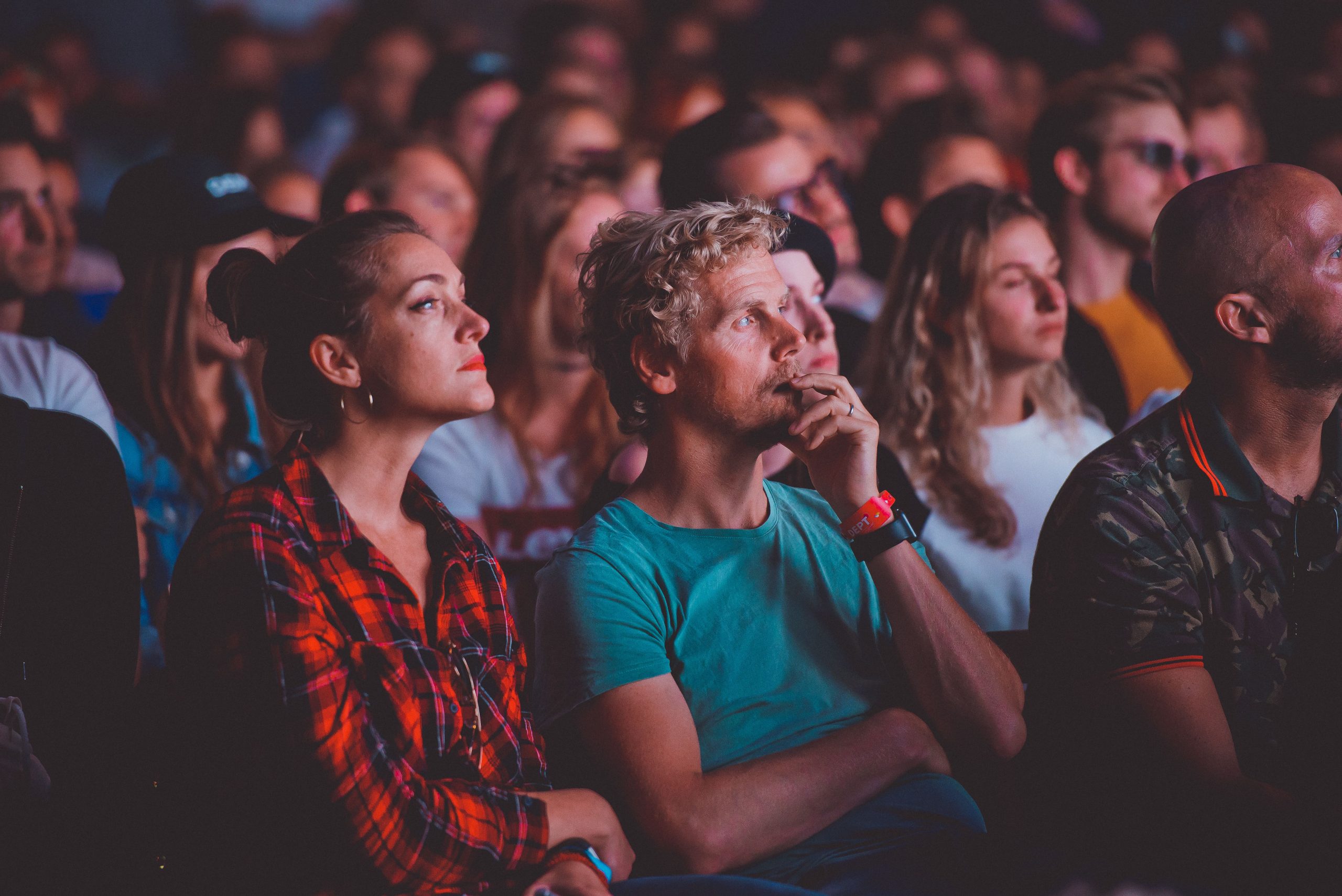
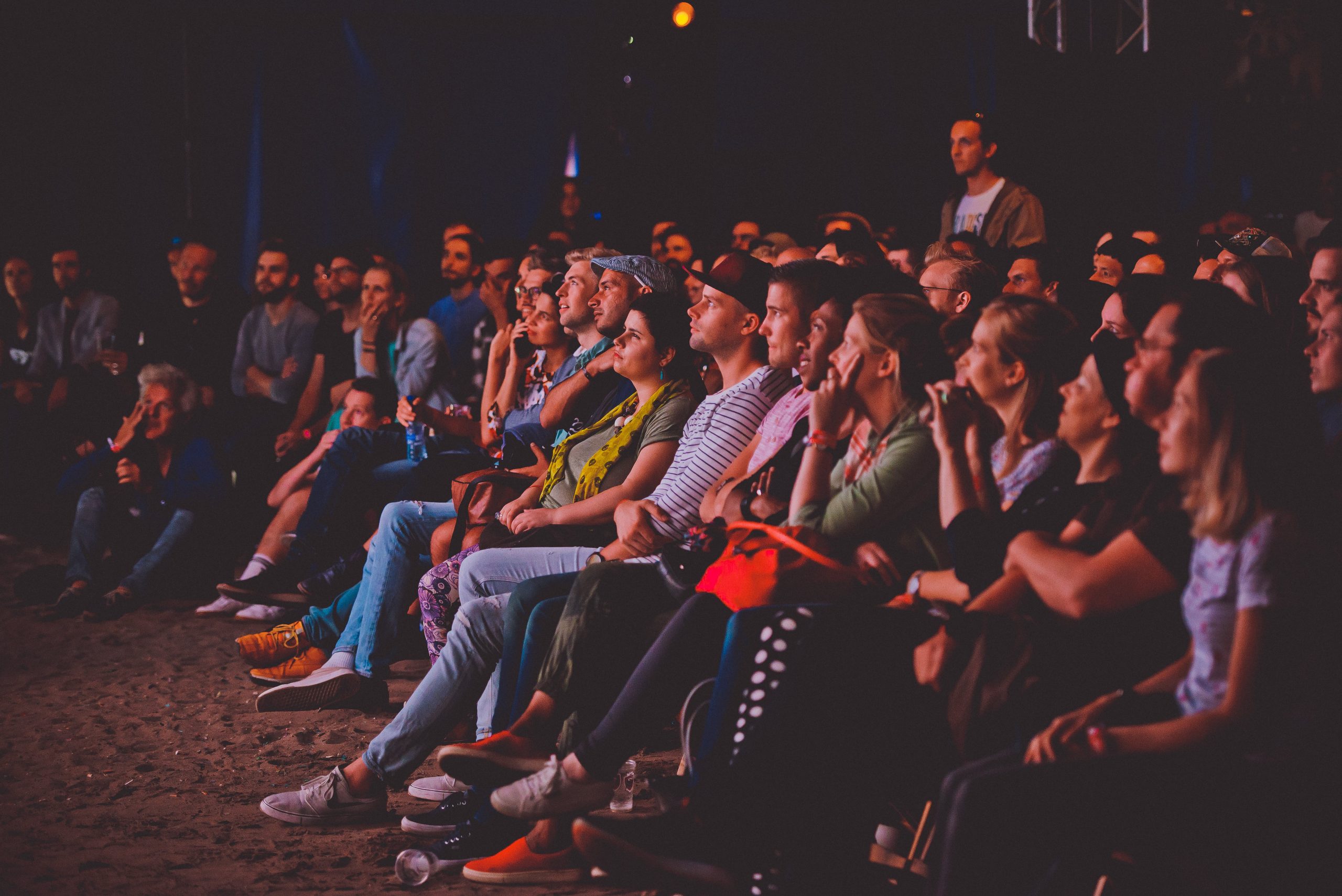
A seamless, online-offline event experience
In two months time, we designed and built a custom made a custom 3D festival map which one could easily explore and that was protected by single sign-on. The design and layout digitally recreated the festival site from the previous four years, squeezing in 15 stages and 35+ short and snappy presentations into a 3-hour event, and included some industry heroes like Stefan Sagmeister and Gmunk. A personal welcome movie by CEO Dimi Albers and DEPT® stage hosts made everyone feel welcome. With the help of Slack and ‘social reporters’, people knew what was going on all the virtual stages, creating a healthy amount of event FOMO, before and after the event.
Presentation topics ranged from diversity and inclusion to data intelligence, the future of voice, and coding for a 3D world. The fun was provided by virtual meditation, magicians, karaoke and DJ sets. ‘Easter eggs’ were hidden around the virtual map, leading people to things like the ten most famous internet cat movies, and a crazy Zoom background contest. The virtual Photo Booth generated a live photo wall, and in all thirteen countries, Depsters could have food delivered to their doorsteps via Ubereats and JustEat Takeaway after a visit to the digital food truck.
Looking forward
Because of COVID-19, virtualisation has become the new norm and this will shape the future by creating new hybrid events which combine both physical and digital elements. And it doesn’t stop with virtual events, imagine virtual product launches, remote assistance and digital campuses. Thinking bigger, one could picture entire online environments that enable organisations to exchange knowledge or try out products and services in an accessible and personal manner.
For organisations that want to explore possibilities for their virtual event and beyond, we offer services such as concepting, designing and building a virtual 3D world, supporting your brand deploy the necessary technology and security to host a large scale event in addition to helping with the production side of things. Because, in the end, life is too short to host boring events.
Questions?
Head of Marketing, EMEA
Mellissa Flowerdew-Clarke
Discover more
In 2020, UK online sales growth hit a 13-year high at +36.6% year-on-year. With e-commerce revenues growing worldwide, many new digital-native brands have entered the market, while existing companies have rushed to optimise experiences to compete for the attention of potential customers. With competition so fierce, premium digital experiences will be key to brand differentiation and securing sales in this new e-commerce landscape.
With smartphones and smart devices now virtually essential parts of daily life, users are more digitally connected than ever before. This raises consumers’ standards when it comes to their digital experience; the connected customer prefers experiences that are as beautiful as they are functional. They will simply disengage rather than wrestle with a poorly designed product. Here are some of the key considerations to help brands excel in experience.
Importance of experience
The scope of experience optimisation is vast, encompassing both user (UX) and customer experience (CX), both of which carry significant value when executed well. With many online vendors offering the same products from site to site, it has become largely understood that CX is now more important than price; every $1 a business invests in UX is said to return $100, generating an ROI of 9,900%.
Strong CX and UX are focused on facilitating positive interactions that fulfil the customer’s needs, guiding them to purchase and keeping them loyal to products and brands. There is no single winning formula, as the best examples are tailored to individual audience groups. What is optimum for one type of user may not be for another, so the key is balancing variety and flexibility. To define a great experience, rather than assuming they know what customers want or need, companies need to get close to their users to understand how they interact with brands and technology and learn from these insights.
Opening digital doors
COVID-19 and the resulting global lockdowns quickly changed online shopping from a valuable option to a necessity, forcing many new users into the market. It’s indicated that 75% of consumers who only first started using digital commerce channels during the pandemic will continue shopping online when things return to ‘normal’. Meanwhile, the needs and expectations of existing users shifted as they became more reliant on digital purchasing outside of their usual habits and preferences.
The key to opening the digital doors to this wealth of new users and potential customers is for brands to take stock of behaviour changes to create digital experiences that meet their varying needs and expectations. What worked pre-pandemic most likely won’t work post.
Customer journey mapping is one of the optimum ways to understand customers and guide them through to purchase. The exercise creates a visual representation of customers’ interactions with a brand, helping the company to step into its customers’ shoes and see the business from their perspective to understand their pain points and how to improve them. In addition, with customer journeys becoming more complex and difficult for brands to track interactions, it is becoming increasingly essential for companies to better collate, analyse and utilise the data that’s available to them. Customer data platforms (CDPs) make that possible. By unifying and utilising customer data sources to their full potential, brands can better understand their customers, access insightful information and act on it in real time to achieve better results from digital marketing efforts.
By fully understanding customers’ unique journeys, needs and preferences, companies can implement meaningful UX and CX that is most conducive to business success; simplifying the buying process for customers, and increasing sales for the brand.
Maximising brand interactions
Brand experiences are essential for developing customer loyalty. But with the pandemic putting a halt to in-person experiences, brands had to find new, digital means of delivering product advice, brand values and driving shopper engagement.
The acceleration, accessibility and evolution of new digital innovations within the last 12 months has seen brands experiment more with digital technologies to reimagine experiences and engagement across multiple touchpoints. From creative AR campaigns and live video shopping, to leveraging data to deliver hyper-personalised experiences, brands have sought new ways to nurture users into loyal customers.
Lyst partnered with DEPT® to deliver the latter, creating a lasting experience for customers while gaining invaluable user insights that would help the brand shape future experiences. Together we developed a data-fuelled campaign, brought forward with award-winning creativity, that resulted in an interactive quiz for users to ‘Discover your Fashion DNA’, which enabled Lyst to gather lifestyle-oriented data to generate a better understanding of its users, based on their preferences. The success of the campaign centred around a value exchange; while Lyst learns more about their customers to increase relevance of product offerings, the user gets to participate in a fun and immersive experience to learn something about themselves.
Raising the bar
The landscape of how we buy and how we sell is rapidly changing. But the one certainty in this new digital reality is that consumers and buyers are looking for relevant and seamless experiences that extend beyond traditional physical and online stores.
Successful, interactive experiences are essential to standing out and competing in this new landscape, and brands must continue to raise the bar to understand customer needs and meet them in the right place, at the right time, with an optimised experience tailored to their preferences.
The effects of the pandemic have demonstrated how quickly user needs and behaviours can shift. If your business needs advice in creating agile digital solutions to respond to these shifts, get in touch with our team of experts today.
More Insights?
View all InsightsQuestions?
Principal Digital Consultant, Design & Technology
Katy White

Every business has a different growth trajectory. Technology that doesn’t scale in the right directions can become a blocker to future growth, and is one of the reasons why a headless approach is increasing in popularity; as businesses can gain more flexibility and discover greater possibilities for customisation and personalisation.
There are several reasons for the shift towards headless architecture, but speed and scalability most often drive the decision to implement a headless technology stack.
Unleashing the power of microservices
By combining best-of-breed platforms, with niche functionality specialised for commerce, search, payment or data management and so on, businesses can completely customise their front-end to suit their unique needs, as opposed to working with a predetermined tech structure provided by an all-encompassing solution.
When these platforms are integrated with a headless CMS, brands benefit from a centralised content hub. This makes editing much easier: a change in one place is seamlessly deployed everywhere the content is located. Unification improves brand consistency and compliance, and gives marketers more freedom to launch and optimise campaigns in real-time. As a certified Contentful partner, DEPT® utilises the future-ready cloud-native solution to help organisations accelerate growth.
Scaling omnichannel content management
Content consumption is evolving to be more fluid with audiences moving from one device and platform to the next, looking to be immersed and entertained without any interruptions. For brands to keep up with the demand for digital experiences, they need to move fast and avoid bottlenecks of multi CMS silos that can form in different markets or sub-brands when systems’ aren’t connected.
Creating an internal single source of truth through the headless CMS connects departments and streamlines delivery. Push-button deployment moves content into production and radically increases the velocity of fresh content on a global, enterprise scale. Brands can better align content across channels, repurpose existing content to improve its impact and ensure the right message reaches each target audience. The possibilities are limitless. Contentful’s open APIs work seamlessly with other tools or microservices and equip marketers to deliver a truly omnichannel strategy.
The solution is not only favoured by businesses and their marketing teams, but also by digital builders, according to Depsters that were recently Contentful certified.
Advancing commerce and beyond
Headless commerce allows businesses to adopt new touchpoints without needing to rework everything else. Contentful’s building block approach integrates with emerging technologies like AI-powered voice assistants, wearables, and smart applications, while still leveraging traditional channels like web, social media and SMS.
“A modern stack of integrated solutions is required for brands to keep pace with changing commerce by delivering relevant content when, where and how consumers expect it. Contentful runs on the world’s leading commerce platforms, including CommerceTools and Amazon, advancing businesses’ application of these platforms by supporting features such as AWS Auto Scaling,” said Daniel Proctor, Senior Developer at DEPT®. “Wherever Contentful is integrated, its content delivery API (CDA) enhances performance with fast, flexible, caching that can be tailored to individual customer needs and locations. As a result, Contentful effectively manages large spikes in traffic, maintaining a strong cache hit ratio (CHR) and seamless scalability as businesses grow globally.”
DEPT®’s Solutions Architect, Andy Whitehead adds: “The Contentful Marketplace has so many applications available to extend its capabilities through third-party services. You can also write your own custom extensions to work for any different scenario. Contentful’s in-depth documentation and software development kits (SDKs) simplify custom work and make collaboration between developers easier, whether that’s joining a client’s in-house team or getting caught up to speed when optimising the platform down the line with new functionality.”
Content delivery plays a key role in all industries, not just e-commerce. Moving quickly, without being held back by development constraints of some more traditional CMS platforms, is critical for conversion rates and is a growing requirement when building a stable solution at scale. This applies in a B2B context as well. More than 80% of business purchasers surveyed by Salesforce want consumer-level customer experience, and more than two-thirds of respondents say that they have switched vendors to get it. There’s a huge opportunity for B2B business owners to tap into through better technology and personalisation, considering 77% of B2B buyers surveyed by Gartner described their most recent purchase as very complex or difficult.
Reducing development time
Contentful’s new take on content as a service (CaaS – a sub-group of SaaS) simplifies the set-up and deployment processes, allowing developers to get started faster and spin up solutions that reduce businesses’ reliance on technical teams.
“Contentful is programming language agnostic, meaning teams can work in their preferred language and businesses moving into the model can keep content as it is without having to migrate data, for example, as they move from an HTML site to a React single-page application (SPA),” commented Andy Blyth, Technical Architect at DEPT®.
He further adds, “Contentful is constantly adding new features and functionality, allowing businesses using the service to evolve with the latest technology. Tagging has recently been released, grouping pages or objectives by characteristics or usage, which creates content classifications and eases the process of organising various components and multimedia files for editors.”

“Contentful is constantly adding new features and functionality, allowing businesses using the service to evolve with the latest technology.”
Andy Blyth, Technical Architect, DEPT®
Publishing content at scale
Chris Eccles, Technical Architect at DEPT® describes a Contentful project currently in development: “We’re working with an online learning provider that also performs English language tests for university, professional or migration applications. Contentful is populating the platform and we’re using its new web app, Compose. Setting up structured and reproducible fields is straightforward and the content management interface is the most intuitive I’ve ever seen. It uses a page-based model to streamline the process of adding and publishing content at scale, giving editors clear and flexible templates to quickly deliver uniform digital experiences, and in this case, across all of its programmes and courses.”
Contentful’s uncluttered interface experience helps reduce the level of intimidation and complexity for the user with simple logic and drag-and-drop features. Its ability to integrate with more no-code and low-code (NC/LC) tools means people from cross-functional teams have the ability to offset business demands for development, automate processes and accelerate digital transformation.

“The content management interface is the most intuitive I’ve ever seen.”
Chris Eccles, Technical Architect, DEPT®
Solutions for future business goals
Making the move to microservices via integrated headless solutions like Contentful creates the foundation for growth, however that may relate to your business. It’s easy to look at a new piece of technology and relate to case studies that highlight how it helped other companies increase volumes of sales, but growth is more dynamic and often involves changing workflows, governance, supporting technology and even security needs.
Overconfidence in a system’s ability to scale, without taking into account growing pains and unforeseen complexities can block innovation and lead to technical depth. In today’s ever-changing landscape, it’s difficult to predict what the future will hold, therefore, creating a solution built for change will underpin any avenue.
Putting Contentful into practice
Over the years, DEPT® has supported various companies with the successful application of Contentful. We collaborated with global shipping container supplier CARU Containers on a digital transformation project that involved building a new B2B online store fuelled by Contentful and Salesforce.
The new website was launched across ten countries as part of the refreshed CARU brand. Content pages were created to tell the story of the company, the employees, and each product. Additionally, there was content for social sharing and digital advertising: whitepapers, listicles, infographics and interviews. Content was displayed dynamically and adaptive to the language and country of each visitor, allowing one site to match up with an international audience. This content suite gave CARU positioning on LinkedIn, Google Ads, Microsoft Ads and the Google Display network. During the six month period of analysis and improvement, conversion grew by 400%, a sizable improvement that any company would be happy to see.
Content was also a key ingredient in transforming the 2021 Eurovision Village into a 3D Virtual World. The Eurovision Song Contest was streamed live, alongside additional DJ sets and performances and fresh content was served up daily throughout the nine-day festival. DEPT® integrated Contentful as the CMS, enabling a partnership agency to interact with guests and communicate updates in real-time, such as changes to the line-up.
We’ve also collaborated on projects for leading seafood supplier, Sykes Seafood; B2B travel company, Cartrawler; the Global Psoriasis Atlas; student discount platform, Totum; and the world’s number one chemical distributor, DigiB.
To stay ahead of the competition, agility and adaptability is a must. If your company has already implemented a headless stack but isn’t maximising its capabilities to their full potential, or is still weighing up the options, we’re here to help.
Contact us to discuss your digital landscape and how Contentful may be able to fit into it, perhaps by enriching your product information management (PIM) solution with marketing content or translating content in a mobile app.
More Insights?
View all InsightsQuestions?
Principal Digital Consultant, Design & Technology

